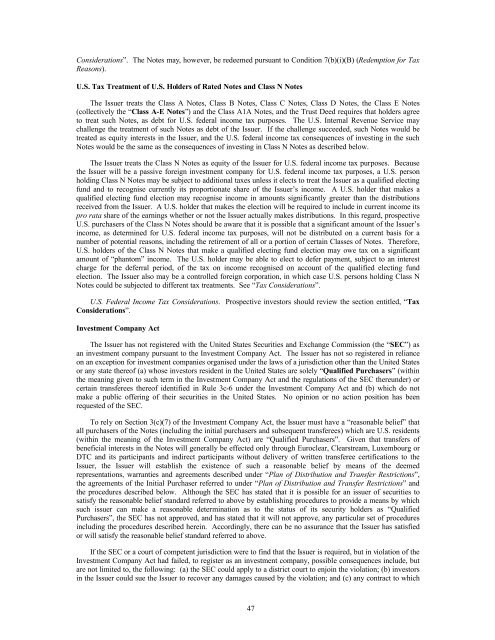Gresham Capital CLO IV B.V. - Irish Stock Exchange
Gresham Capital CLO IV B.V. - Irish Stock Exchange
Gresham Capital CLO IV B.V. - Irish Stock Exchange
Create successful ePaper yourself
Turn your PDF publications into a flip-book with our unique Google optimized e-Paper software.
Considerations”. The Notes may, however, be redeemed pursuant to Condition 7(b)(i)(B) (Redemption for Tax<br />
Reasons).<br />
U.S. Tax Treatment of U.S. Holders of Rated Notes and Class N Notes<br />
The Issuer treats the Class A Notes, Class B Notes, Class C Notes, Class D Notes, the Class E Notes<br />
(collectively the “Class A-E Notes”) and the Class A1A Notes, and the Trust Deed requires that holders agree<br />
to treat such Notes, as debt for U.S. federal income tax purposes. The U.S. Internal Revenue Service may<br />
challenge the treatment of such Notes as debt of the Issuer. If the challenge succeeded, such Notes would be<br />
treated as equity interests in the Issuer, and the U.S. federal income tax consequences of investing in the such<br />
Notes would be the same as the consequences of investing in Class N Notes as described below.<br />
The Issuer treats the Class N Notes as equity of the Issuer for U.S. federal income tax purposes. Because<br />
the Issuer will be a passive foreign investment company for U.S. federal income tax purposes, a U.S. person<br />
holding Class N Notes may be subject to additional taxes unless it elects to treat the Issuer as a qualified electing<br />
fund and to recognise currently its proportionate share of the Issuer’s income. A U.S. holder that makes a<br />
qualified electing fund election may recognise income in amounts significantly greater than the distributions<br />
received from the Issuer. A U.S. holder that makes the election will be required to include in current income its<br />
pro rata share of the earnings whether or not the Issuer actually makes distributions. In this regard, prospective<br />
U.S. purchasers of the Class N Notes should be aware that it is possible that a significant amount of the Issuer’s<br />
income, as determined for U.S. federal income tax purposes, will not be distributed on a current basis for a<br />
number of potential reasons, including the retirement of all or a portion of certain Classes of Notes. Therefore,<br />
U.S. holders of the Class N Notes that make a qualified electing fund election may owe tax on a significant<br />
amount of “phantom” income. The U.S. holder may be able to elect to defer payment, subject to an interest<br />
charge for the deferral period, of the tax on income recognised on account of the qualified electing fund<br />
election. The Issuer also may be a controlled foreign corporation, in which case U.S. persons holding Class N<br />
Notes could be subjected to different tax treatments. See “Tax Considerations”.<br />
U.S. Federal Income Tax Considerations. Prospective investors should review the section entitled, “Tax<br />
Considerations”.<br />
Investment Company Act<br />
The Issuer has not registered with the United States Securities and <strong>Exchange</strong> Commission (the “SEC”) as<br />
an investment company pursuant to the Investment Company Act. The Issuer has not so registered in reliance<br />
on an exception for investment companies organised under the laws of a jurisdiction other than the United States<br />
or any state thereof (a) whose investors resident in the United States are solely “Qualified Purchasers” (within<br />
the meaning given to such term in the Investment Company Act and the regulations of the SEC thereunder) or<br />
certain transferees thereof identified in Rule 3c-6 under the Investment Company Act and (b) which do not<br />
make a public offering of their securities in the United States. No opinion or no action position has been<br />
requested of the SEC.<br />
To rely on Section 3(c)(7) of the Investment Company Act, the Issuer must have a “reasonable belief” that<br />
all purchasers of the Notes (including the initial purchasers and subsequent transferees) which are U.S. residents<br />
(within the meaning of the Investment Company Act) are “Qualified Purchasers”. Given that transfers of<br />
beneficial interests in the Notes will generally be effected only through Euroclear, Clearstream, Luxembourg or<br />
DTC and its participants and indirect participants without delivery of written transferee certifications to the<br />
Issuer, the Issuer will establish the existence of such a reasonable belief by means of the deemed<br />
representations, warranties and agreements described under “Plan of Distribution and Transfer Restrictions”,<br />
the agreements of the Initial Purchaser referred to under “Plan of Distribution and Transfer Restrictions” and<br />
the procedures described below. Although the SEC has stated that it is possible for an issuer of securities to<br />
satisfy the reasonable belief standard referred to above by establishing procedures to provide a means by which<br />
such issuer can make a reasonable determination as to the status of its security holders as “Qualified<br />
Purchasers”, the SEC has not approved, and has stated that it will not approve, any particular set of procedures<br />
including the procedures described herein. Accordingly, there can be no assurance that the Issuer has satisfied<br />
or will satisfy the reasonable belief standard referred to above.<br />
If the SEC or a court of competent jurisdiction were to find that the Issuer is required, but in violation of the<br />
Investment Company Act had failed, to register as an investment company, possible consequences include, but<br />
are not limited to, the following: (a) the SEC could apply to a district court to enjoin the violation; (b) investors<br />
in the Issuer could sue the Issuer to recover any damages caused by the violation; and (c) any contract to which<br />
47

















